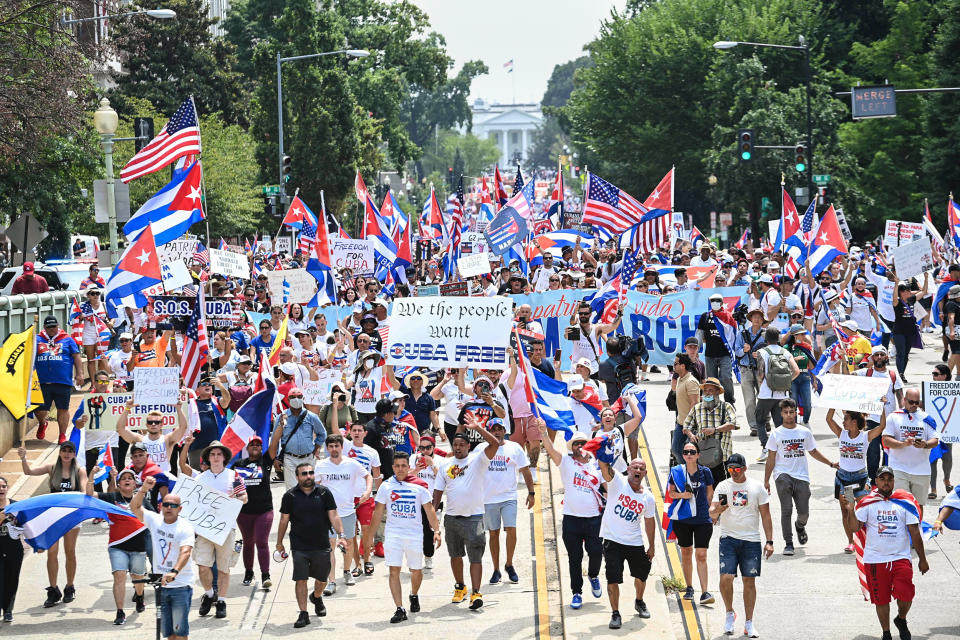U.S. announces Cuba sanctions as Biden meets with Cuban American leaders
- Oops!Something went wrong.Please try again later.
- Oops!Something went wrong.Please try again later.
- Oops!Something went wrong.Please try again later.
The Biden administration imposed new sanctions against two top Cuban officials and the Cuban National Revolutionary Police for their role in the crackdown against anti-government protesters in Cuba.
The announcement came right before President Joe Biden hosted Cuban-American leaders, including Sen. Bob Menendez, D-N.J., Rep. Gregory Meeks, D-N.Y., and Manny Diaz, chair of the Florida Democratic Party, at the White House Friday afternoon to discuss the sanctions and other aspects of the U.S. response the regime’s violent suppression of peaceful protests.
The Treasury actions against two Cuban police force officials, Oscar Callejas Valcarcel and Eddy Sierra Arias, were in response to “actions to suppress peaceful, pro-democratic protests in Cuba that began on July 11,” according to the U.S. Treasury Dept. statement.
“The Treasury Department will continue to designate and call out by name those who facilitate the Cuban regime’s involvement in serious human rights abuse,” said Director of the Office of Foreign Assets Control Andrea M. Gacki in a press release on Friday. “Today’s action serves to further hold accountable those responsible for suppressing the Cuban people’s calls for freedom and respect for human rights.”
Biden said that the government’s crackdown amounted to a “brazen violation of the rights of the Cuban people” and accused the regime of putting demonstrators in mass detentions and hosting sham trials.
As part of the U.S. response, Biden said his administration was expanding assistance to political prisoners and exploring ways to bring internet to the island, as well as ways to increase the flow of remittances to the Cuban people without the military being able to take a cut. He also said there would be more sanctions in the coming days “unless there’s some drastic change” in the Cuban regime’s behavior, but added that he did not anticipate that happening.
Cuban Americans have been denouncing the arrests of protesters in the communist-run island following historic protests on July 11, a rare event in the communist-run island not seen since the 1959 revolution.

The protests in Cuba were sparked by the island’s severe economic crisis, including shortages in food and medicine, as well as rolling blackouts, but also included calls for “libertad” or “freedom.” Many chanted “we want change” and “down with the dictatorship.”
Over 700 people are being held by the government, according to human rights organizations. There have been reports of some people being held incommunicado and others receiving summary trials, which Cuba has denied. The protests ended with security forces and civilians with sticks beating protesters and arrests.
For weeks, Cuban Americans have held protests and rallies in support of those on the island and called on Biden to take more action against Havana. Cuban Americans are an important voter bloc, and former President Donald Trump won a majority of their support in Florida.
Cuba’s government has largely blamed the United States and the decadeslong economic embargo for the protests and said demonstrators were also incited on social media.
In the U.S., Cuban Americans have held protests and rallies in support of those on the island and called on Biden to take more action against Havana.
The Treasury Department announced sanctions last week against Cuba’s defense minister and an elite brigade of government security forces that took part in the crackdown on protesters.
The White House has held several meetings with Cuban American leaders and members of Congress since the protests swept through the island.
Yotuel Romero, one of the performers of the song “Patria y Vida,” or “Homeland and life,” a phrase that was shouted repeatedly during the protests, was at the White House meeting. “Patria y Vida” has become a sort of anthem in protests and is a play on the revolutionary slogan “Homeland or Death.”
CEO of eMerge Americas and Roots of Hope founder L. Felice Gorordo as well as Miami Freedom Project co-founder, Ana Sofía Peláez, were also in attendance.
Follow NBC News Latino on Facebook, Twitter and Instagram.

